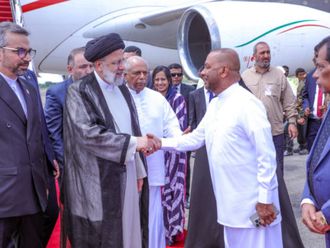Tripoli: Libya’s internationally recognised government conducted air strikes on a military camp on Saturday and attempted to hit the airport in Tripoli, the capital controlled by a rival administration, officials said.
The attack came a day after the official government said it had launched a military offensive to “liberate” Tripoli, which has been seized by a group called Libya Dawn in August, reinstating a previous assembly.
The recognised Prime Minister Abdullah Al Thinni and the elected parliament have been confined to eastern Libya since then but both administrations allied to armed factions fight for control four years after the ousting of Muammar Gaddafi.
Saqer Al Joroushi, an eastern air force commander, said his aircraft hit the Mitiga airport in Tripoli and a camp used by Libya Dawn near another airport in the capital.
A security source in Tripoli said the camp had apparently been hit while planes had missed the airport.
Tripoli-based Al Nabaa television station said war planes had also hit the western Zuwara airport though there was no immediate confirmation for this.
On Friday, UN Special Envoy Bernardino Leon said the military offensive threatened international efforts to reach agreement in the next few days on a unity government and lasting ceasefire.
Western leaders say the UN talks are the only way to end the chaos in Libya where Islamist militants have gained ground.
Both sides have attacked each other with war planes in the past few days. They face internal divisions and are dominated by former rebels who helped oust autocrat Muammar Gaddafi, but who now use their weapons to fight for territory.
Leon warned an agreement between the strife-torn country’s rival political factions is still a way off, in remarks published Saturday after the launch of crunch talks.
Libya has been wracked by violence since the NATO-backed uprising that toppled longtime dictator Moamer Kadhafi in 2011, with rival militias and administrations battling for power.
Three days of UN-mediated talks that began on Friday are aimed at reaching an agreement to form a national unity government.
“An agreement is going to be difficult, we are still a long way off,” UN special envoy Bernardino Leon told the Spanish newspaper El Pais from Morocco.
As the talks got under way in Morocco, the internationally recognised government said loyalist forces had launched an offensive to “liberate” Tripoli, seized by Islamist-backed militia last summer.
“We think this activity is linked to the negotiations,” Leon was quoted as saying.
“In both camps, there are the hardliners and the moderates,” he said. “The moderates want to reach an agreement, while the hardliners prefer a military solution, they want to impose it on the other party by force.”
“The international community can’t accept such an outcome.
“What the international community didn’t do well after the 2011 intervention is not to stay on the ground. It wasn’t about rebuilding a state, it was about building one from scratch,” he said.
Leon has said the talks in Morocco would focus on security arrangements, the creation of a national unity government and confidence-building measures.
“By Sunday, we would like to have these three documents ready and if possible, published, as already agreed (as) part of what will be a final package,” Leon has said.












